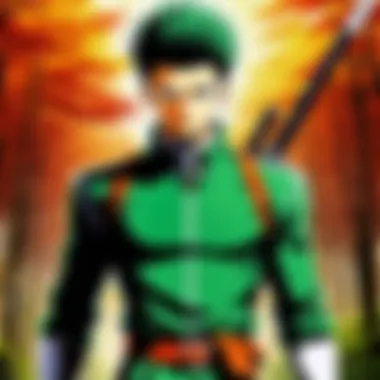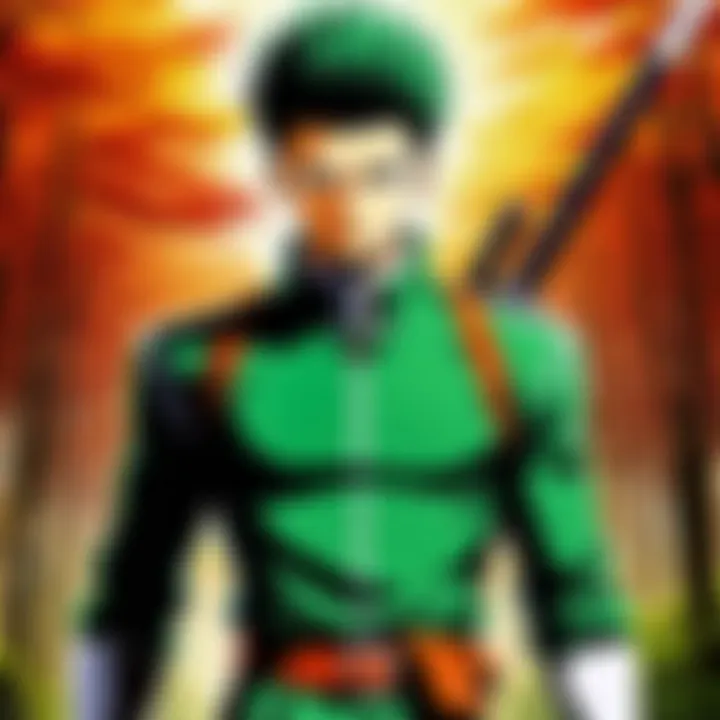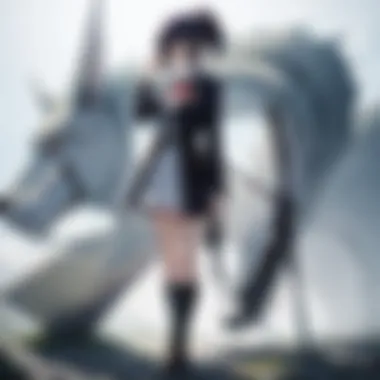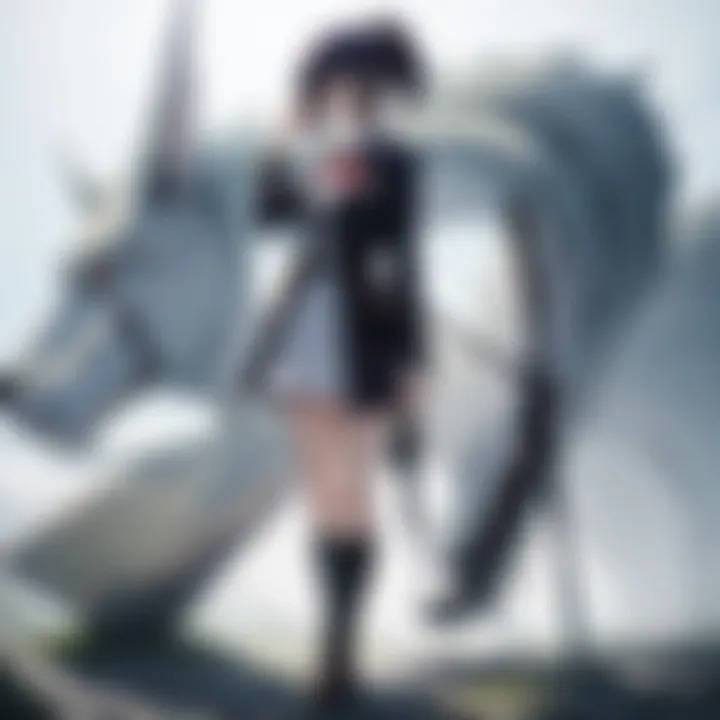Understanding the Role of X Hunter in Anime and Manga Culture


Intro
The concept of 'X Hunter' in anime and manga is a fascinating subject for exploration. This archetype portrays characters who embark on journeys filled with challenges, moral dilemmas, and profound personal growth. As we delve into this topic, we will examine how the characteristics and motivations of hunters unfold across different narratives. By doing so, we aim to gain insights into their significance in both the realms of storytelling and cultural contexts.
Understanding the role of hunters in these mediums helps underscore their thematic richness and character dynamics. In an era when stories often confront the nuances of morality and purpose, examining how hunters navigate their paths can reveal deeper implications for audiences, including their desires, struggles, and resolutions.
Character Analysis
Overview of Character Development
Hunters are not just mere adventurers; they often represent an array of complex traits and motives. Throughout various series, hunters range from skilled warriors with a strong sense of duty to those driven by revenge or a longing for identity.
For example, Gon Freecss from Hunter x Hunter portrays a naive optimism intertwined with profound personal loss, which guides his development throughout the series. On the other hand, characters like Kirito from Sword Art Online display a mix of determination and internal conflict that stems from their experiences within virtual and real worlds.
The evolution of these characters indicates a broad spectrum of issues, including the exploration of strength, friendship, and the dark sides of human nature. As they evolve, readers are often invited to reflect on their personal journeys as well.
Key Relationships and Dynamics
The relationships that hunters develop with other characters often play a crucial role in their narratives. These dynamics can expose vulnerabilities or amplify strengths, adding layers to their identities. For instance, the bond between Gon and Killua showcases a duality of friendship and dependence, impacting their actions significantly.
"Friendship is not just about understanding one another; it's also about pushing each other to grow beyond limits."
Similarly, the interactions between the protagonist and antagonists often provide the groundwork for conflict resolution or moral questioning. The complexity in these relationships deepens engagement and reflects real cultural dilemmas faced by individuals in society today.
Thematic Exploration
Central Themes and Messages
The thematic elevation of hunters often revolves around the concepts of identity, belonging, and sacrifice. Many stories present hunters grappling with the weight of their choices, which reveals not only their internal struggles but also broader social commentaries.
For instance, the pursuit of personal ambitions can reflect societal pressures, while the sacrifices made along the way can resonate with audiences experiencing similar dilemmas in their own lives.
These themes extend beyond personal narratives; they touch on ideals like justice and revenge. Works such as Tokyo Ghoul delve into moral complexities, illustrating how the hunter's journey often reflects a quest for meaning in a chaotic world.
Cultural Context and Influences
Understanding the cultural backdrop is crucial to grasping the role of hunters in anime and manga. Different cultures present unique perspectives on heroism, duty, and the significance of personal sacrifice. In Japanese culture, the concept of honor plays a vital role, informing many narratives.
As a result, hunters can embody cultural values and reflect society’s evolving narratives. The impacts of globalization have also led to new interpretations and subversions of the hunter archetype, resulting in diverse representations seen in contemporary works.
By tracing the evolution of the hunter archetype, the audience can appreciate the depth of these narratives. The enduring appeal of hunters lies in their relatable struggles and the profound themes interwoven within their stories. As anime and manga continue to grow and evolve, the role of hunters remains pivotal in shaping cultural discourse and narrative structure.
Intro to Hunter
The concept of the X Hunter holds significant weight in anime and manga culture. It serves not only as a captivating character archetype but also as a lens through which we can explore various themes and cultural elements. Understanding this role is paramount for both fans and creators, as it sheds light on the complexities of character motivations and narrative structures.
Characters labeled as hunters often embody a range of ideals, challenges, and personal journeys. They venture into worlds that test their abilities, push their limits, and confront moral dilemmas. This archetype allows for discussions about human nature, the quest for knowledge, and the pursuit of goals, which resonate with many audiences. Furthermore, hunters symbolize a blend of adventure and self-discovery, making this archetype extremely relevant in modern storytelling.
By studying X Hunters, one can appreciate the blend of action and philosophical contemplation in various anime and manga. The reader will gain insights into how these characters reflect societal values, fears, and aspirations. Thus, this exploration aims to reveal deeper meanings beneath the surface of engaging stories, encouraging a more comprehensive understanding of what it means to be a hunter in these narratives.
Defining the Hunter Archetype
The hunter archetype in anime and manga encompasses a variety of traits and roles. Typically, these characters are often seen pursuing some form of goal, whether it be capturing monsters, seeking knowledge, or finding personal redemption. These characters are not one-dimensional; they are multifaceted, often struggling with internal and external conflicts. This complexity is what makes them captivating to the audience.
Hunters are usually defined by a set of core characteristics:


- Determination: They have strong willpower and persist despite obstacles.
- Special Skills: Many possess unique abilities or skills that distinguish them from others.
- Strong Morals: They often face ethical dilemmas that test their values.
- Connection to Nature: Many X Hunters are depicted in harmony with their environment or specifically the creatures they pursue.
Understanding these attributes gives insights into their narratives and how they interact with other characters. This archetype plays a vital role in advancing the plot and developing themes within the story.
Historical Context of Hunters in Japanese Media
The archetype of hunters has a rich history in Japanese media, evolving over decades. Its roots can be traced back to folklore and mythology, where figures often embarked on quests, facing formidable challenges. In early literature, hunters symbolized mankind's struggle against the unknown, embodying bravery and tenacity.
As time progressed, the image of hunters transitioned onto the screen in various forms:
- Feudal Japan Samurai Stories: Early adaptations often highlighted samurai as hunters, battling demons or other foes. These stories emphasized honor and duty.
- Monster Hunting in Modern Manga: More recent series, such as "Hunter x Hunter" and "Attack on Titan," portray hunters exploring complex moral landscapes while battling grotesque foes.
The evolution of hunters in media reflects broader themes of survival, exploration, and human emotion. By placing these characters in various contexts, the stories highlight changing perspectives in Japanese society, allowing audiences to engage with timeless narratives that resonate on multiple levels.
"In understanding the historical significance of hunters, we appreciate how they mirror societal values and the shifting landscape of Japanese storytelling."
These layers of meaning contribute to the continued relevance of the hunter archetype in contemporary anime and manga.
Character Analysis of Hunters
Character analysis of X Hunters is crucial in understanding the depth and complexity of these figures within anime and manga. It allows us to explore their motivations, backstories, and the roles they play in their respective narratives. This section aims to provide insight into various characters categorized as hunters, highlighting the significance of their actions and why they resonate with audiences.
Notable Examples in Popular Series
Several anime and manga series feature prominent X Hunter characters. One such character is Gon Freecss from Hunter x Hunter. Gon embodies the spirit of curiosity and the drive for self-discovery. His journey as a hunter is not just about capturing creatures or pursuing goals but also about understanding himself and the world around him.
Another notable example is Shinobu Kocho from Demon Slayer: Kimetsu no Yaiba. As a skilled demon slayer, she showcases the duality of strength and compassion. Her motivations stem from a desire for revenge against demons, driven by personal loss. This complexity adds depth to her character and informs the audience about the emotional burdens that come with the hunter's path.
From Attack on Titan, the character of Levi Ackerman serves as a stark contrast to other hunters. Levi's demeanor reflects a hardened past and a strict code of ethics. He represents the darker side of hunting, showcasing the psychological impact of perpetual conflict and survival.
Through these examples, we can see the variety within the hunter archetype. Each character provides a different lens through which to view the motivations that drive hunters in their quests, often reflecting broader themes of humanity, trauma, and resilience. These representations are vital in making the characters relatable and their struggles poignant.
Motivations and Goals
Understanding the motivations and goals of X Hunters distills the essence of their character. Typically, X Hunters are driven by a combination of personal aspirations and external pressures. These motivations often fall into categories such as quest for knowledge, retribution, survival, or protection of loved ones.
For instance, in My Hero Academia, Izuku Midoriya’s desire to become a hero is deeply personal. He wants to prove his worth despite initially lacking abilities, symbolizing the determination that many fans can relate to. Similarly, characters in Fairy Tail, like Erza Scarlet, are motivated by loyalty to their friends and a desire to protect their guild. Their goals illuminate themes such as selflessness and camaraderie, which resonate strongly with audiences.
The goals of hunters also evolve as they progress through their journeys. Initial motivations may transform in response to personal experiences and challenges faced along the way. For instance, Gon’s primary aim starts as a quest to find his father but shifts towards broader understandings of friendship and sacrifice.
These character motivations are essential in shaping the narratives of their respective stories. They create conflict and drive the plot forward, making the characters' journeys compelling and meaningful. This analysis contributes to a richer appreciation of how X Hunters reflect human experiences and emotions through their stories.
Themes Associated with Hunters
The themes associated with X Hunters are central to understanding their role in anime and manga culture. These themes include exploration of morality, friendship, and conflict, all of which resonate deeply with audiences. They reflect not only the characters’ journeys but also broader societal issues that viewers can relate to, making this subject matter significant in its cultural relevance.
Exploration of Morality
Morality is a key theme when examining X Hunters. Many stories present hunters grappling with ethical dilemmas. They are often faced with choices that challenge their values. For instance, does a hunter cross a line in achieving their goals? This internal conflict often creates tension in the narrative. It forces audiences to question their understanding of good and evil.
X Hunters frequently embody shades of gray. They are not purely heroic; they have flaws and face real-world consequences for their actions. This complexity makes them relatable to viewers, who may find themselves in moral quandaries in their own lives. Moreover, these stories can mirror societal issues, prompting discussions about right and wrong in everyday situations.
Friendship and Bonds
Another prominent theme associated with X Hunters is the importance of friendship. In many narratives, bonds between hunters serve as the emotional foundation of the story. These relationships often evolve through shared experiences and challenges. Together, they confront dangers and personal growth. The presence of camaraderie adds depth to the characters. It shows how they rely on each other, highlighting the significance of teamwork.
Furthermore, friendships can also lead to conflicts. Misunderstandings and differing motivations can put a strain on relationships. These dynamics create drama and enhance character development. The deeper connections between characters make the narrative engaging. They also resonate with the audience, who can find truth in the friendships portrayed on screen.


Conflict and Resolution
X Hunters are typically embroiled in conflicts, both external and internal. External conflicts often arise from their hunting missions. They might confront villainous adversaries or societal forces working against them. Internal conflicts can include their personal goals versus their responsibilities to others. These clashes shape the narrative and provide emotional stakes.
The resolution of these conflicts is crucial for character development. It showcases how the hunters evolve, learn, and grow. Often, conflicts lead to new insights or changes in perspective, reflecting the complex nature of life.
Understanding these themes associated with X Hunters helps to appreciate their roles within anime and manga. Themes such as morality, friendship, and conflict provide context and depth that appeal to viewers.
In summary, the investigation of themes within the context of X Hunters serves as a lens to view deeper societal implications. These elements not only drive the plot but also enrich character arcs and provide valuable messages to the audience.
Cultural Significance of Hunters
The concept of hunters in anime and manga carries deep cultural significance that transcends mere entertainment. These characters embody various social and psychological themes, serving as mirrors to both individual desires and collective societal issues. The prominence of hunters integrates various elements like courage, loyalty, and the struggle for identity. They reflect core aspects of Japanese culture, including tenacity and resilience, all while mirroring international influences as well.
Representations of Japanese Society
Hunters frequently symbolize the complexities of Japanese society. Their journeys often align with societal norms and expectations, reflecting traditional values while grappling with modern dilemmas. The discipline and skill associated with being a hunter can represent the Japanese ethos regarding hard work, perseverance, and honor. They often navigate a world of intricate relationships, echoing the social dynamics prevalent in Japanese culture.
Anime and manga series often depict hunters as individuals facing moral dilemmas. Their quests are not just about physical battles, but also about emotional challenges that resonate with audiences. For instance, in Hunter x Hunter, characters confront their ethical boundaries and the implications of their choices. This shows the duality of human nature, thereby offering a rich narrative that reflects deeper societal issues.
Moreover, hunters can demonstrate how traditional concepts evolve in contemporary settings. The character of Gon Freecss in Hunter x Hunter showcases youthful ambition while also exploring themes of friendship and loss, which resonate with both young and older audiences. Such narratives can lead to discussions on how the younger generation interacts with older cultural values.
Influence on Global Perceptions
The portrayal of hunters in anime and manga contributes significantly to global perceptions of Japanese culture. These characters often illustrate the idea of the 'underdog,' challenging viewers to reconsider their understanding of heroism. As audiences worldwide consume these narratives, the characteristics and values embodied by hunters become accessible and influential.
The fusion of unique storytelling techniques and compelling character arcs often casts hunters in a favorable light, inviting admiration and respect from viewers. Series that feature hunters can diminish stereotypes by showcasing characters who display depth, vulnerability, and complexity. They serve as cultural ambassadors that promote understanding beyond mere stereotypes associated with Japanese anime and manga.
"As anime and manga gain more prominence worldwide, hunters stand out as complex representations of values, beliefs, and struggles that go beyond Japan's borders."
In recent years, the global popularity of series featuring hunters has spurred discussions in fan communities, further expanding the dialogue around cultural values. The shonen genre, in particular, emphasizes physical prowess yet also values emotional intelligence, expanding viewers' perspectives on what being a hero means.
The Evolution of the Hunter Archetype
The evolution of the hunter archetype presents a fascinating layer within anime and manga culture. This progression reflects not only the changing preferences of audiences but also the shifting societal values that influence narrative construction. Understanding this evolution is essential because it provides insight into how characters are shaped by their contexts, both culturally and temporally. The hunter archetype has transitioned from simpler representations to complex, multifaceted characters, thereby exposing evolving motivations, philosophies, and conflicts.
From Traditional Depictions to Modern Interpretations
Traditional depictions of hunters often portray them as simple, archetypal figures. In earlier works, hunters primarily functioned as straightforward protagonists or antagonists. They were defined by their objectives, such as acquiring resources or seeking glory. For example, in classic tales like "Berserk" or early "Dragon Ball" stories, hunters are heroic yet somewhat one-dimensional. These characters often carry clear moral alignments, making it easy for audiences to understand their motivations and actions.
However, as storytelling matured, so did the nuances surrounding the hunter figure. Modern interpretations have begun to delve deeper into their psychological and emotional landscapes. Characters like Gon Freecss from "Hunter x Hunter" exhibit internal struggles that question notions of morality and friendship. His motivations transcend typical goals of strength or wealth; they delve into deeper emotional connections and character growth. This marks a significant shift from traditional portrayals, showcasing how the hunter or hunted relationship can reflect broader themes found in contemporary narratives.
Trends in Recent Works
Recent works have further pushed the boundaries of the hunter archetype. Series like "Attack on Titan" intricately weave themes of survival, societal structure, and existential crises into their narratives. The character of Eren Yeager embodies this complexity, navigating through moral ambiguities and ethical dilemmas that challenge the reader's sympathies. This evolution indicates a trend where hunters are no longer solely focused on external challenges. Rather, they engage with internal conflicts that resonate more deeply with audiences.
Noteworthy is the increasing representation of female hunters in prominent roles. Characters such as Mikasa Ackerman and Emma from "The Promised Neverland" showcase empowerment and resilience, shifting from passive roles to active participants in their fates. The inclusion of diverse, multidimensional characters reflects broader social movements and provides depth to the hunter narrative.
In summary, the evolution of the hunter archetype in anime and manga unveils a narrative landscape filled with possibilities. It illustrates how characters adapt to societal changes, presenting richer stories that engage audiences on various levels. As the genre continues to evolve, the implications of these transformations remain a topic of interest for both creators and fans alike.
Comparative Analysis with Other Archetypes
The comparative analysis of the 'X Hunter' archetype provides substantial insight into its unique role within anime and manga narratives. By contrasting hunters with other archetypes, we can better understand their motivations, characteristics, and narrative significance. This approach not only enhances our comprehension of hunters but also reveals the multifaceted nature of storytelling in this genre. Analyzing hunters in relation to warriors and collectors highlights the specific traits and values that define them, as well as how they resonate with audiences.
Hunters vs. Warriors
Hunters and warriors often share similar backgrounds and skillsets. Both engage in battles and face formidable enemies. However, their motivations typically differ significantly.


- Purpose: Warriors often fight for honor, redemption, or duty. In contrast, hunters pursue different objectives, such as survival, knowledge, or the thrill of the hunt. This distinction influences their decision-making processes and narrative arcs.
- Character Development: Character development in warriors is frequently centered around their battle skills and honor codes. Hunters, on the other hand, may experience growth through emotional journeys and relationships. This inner conflict can make them more relatable.
- Narrative Roles: In many series, warriors serve as protectors or defenders of their communities. Hunters might be seen more as lone wolves or anti-heroes, adding layers of complexity to their roles. The hunter's portrayal often reflects a broader exploration of existential themes, pushing them deeper into moral ambiguity.
In summary, while both archetypes may partake in combat, the underlying goals and character dynamics set them apart.
Hunters vs. Collectors
Comparing hunters with collectors introduces another distinct perspective on the hunter archetype. Collectors focus on acquiring items, whether for personal reasons or societal status, while hunters engage in the pursuit of challenges and experiences.
- Motivation: Collectors are often motivated by completionism or the value associated with particular items. Hunters are driven by challenges or the thrill of the hunt itself. This fundamental difference shapes their stories and the conflicts they face.
- Character Mindset: Collectors may be portrayed with a more obsessive or possessive mindset, reflecting society's materialistic values. Hunters usually embody a more adventurous spirit, seeking growth rather than mere possession.
- Narrative Themes: The themes surrounding collectors often revolve around greed and possession. Conversely, narratives with hunters explore themes of freedom, exploration, and the consequences of obsession in a different light.
In essence, while both hunters and collectors operate within a collection framework, their differing motivations and thematic explorations provide critics and viewers with much different lenses to understand their actions.
Through this analysis, we can appreciate how the hunter archetype interacts with other character types. This comparative insight emphasizes the versatility and complexity of hunters, enriching our understanding of their contributions to anime and manga culture.
Audience Reception and Interpretation
Understanding the reception and interpretation of the X Hunter archetype is vital for assessing its relevance in anime and manga culture. Audience engagement with these characters shapes not just narrative development but also establishes cultural dialogues. X Hunters often embody themes of perseverance, moral ambiguity, and personal growth, resonating with diverse audiences around the world.
The interpretation of characters is deeply influenced by viewer experiences. Fans often bring their perspectives to the narratives, which enriches discussions about what it means to be a hunter. Fans analyze motivations, ethical choices, and relationships within these stories. This engagement can lead to broader discussions regarding societal values and personal philosophies, making the hunter archetype a focal point of analysis in both fan forums and critical studies.
Fan Theories and Discussions
Fan theories surrounding X Hunters often reflect larger narrative trends and reveal layered interpretations. Enthusiasts scrutinize character arcs and psychological depth, speculating on possible futures or untold backstories. This interactive analysis not only creates community but also pushes creators to think about their narratives. For example, a character's ambiguous morality can spur debates on redemption or moral failure, reflecting the complexities of human nature.
In platforms such as Reddit and Facebook, discussions flourish, allowing fans to share their unique insights and preferences. This builds a rich tapestry of viewpoints that contribute to a collective understanding of the archetype.
Moreover, fan theories often influence mainstream interpretations and may even affect the direction of ongoing series. When audiences rally behind a particular interpretation, it becomes a part of the cultural conversation surrounding the series. This dynamic creates a feedback loop that enhances both audience enjoyment and narrative depth.
Impact of Social Media
Social media has transformed how audiences interpret and discuss X Hunters. Platforms like Twitter and Instagram allow for instantaneous sharing of views, and these conversations can reach vast numbers of fans quickly. Hashtags and memes associated with specific characters create a visual and textual dialogue that animates viewer engagement.
Furthermore, social media provides creators with immediate feedback, shaping the evolution of characters in real-time. Trends on platforms can dictate which character dynamics resonate most with viewers. For instance, if a particular interpretation becomes popular online, creators may incorporate those elements into future plot lines.
This interchange between fans and creators underscores the evolving nature of narrative consumption and storytelling in the anime and manga industry.
The interplay between audience interpretation and creator intent is crucial in understanding the legacy of the X Hunter archetype in modern storytelling.
Finale
In summary, the role of the X Hunter in anime and manga culture plays a crucial part in understanding both the narratives and character dynamics these mediums offer. The hunter archetype represents not just individuals with the task of pursuing goals but also embodies broader themes of morality, friendship, and conflict resolution. By disassembling the character traits, motivations, and thematic implications surrounding X Hunters, this article sheds light on their significance in storytelling.
The insights gathered reveal that hunters are often depicted as more than just adventurers; they are complex figures whose journeys resonate personally with the audience. The development of the hunter archetype mirrors societal changes and global perceptions, allowing for a rich tapestry of interpretations that reflect the times in which they are created.
Beyond character studies, the evolution of the X Hunter through various eras of anime and manga helps to map the shifting cultural landscape in Japan and around the world. Audiences engage with these narratives, providing fan theories and discussions that further enrich the community's understanding of these characters.
Summary of Insights
Key takeaways from this analysis of X Hunters include:
- The hunter archetype serves as a vehicle to explore significant themes such as morality and interpersonal connections.
- Notable examples from popular series highlight the range and complexity of these characters, from pure action-driven personalities to those deeply woven with emotional and ethical dilemmas.
- The cultural significance of hunters extends beyond Japan, impacting global views of heroism, ambition, and personal growth.
The X Hunter is not merely a character, but a reflection of the evolving human experience.
This comprehensive understanding adds depth to our appreciation of anime and manga, suggesting that the stories we consume often mirror the struggles and achievements faced in our own lives.
Future Directions for the Hunter Archetype
As anime and manga continue to evolve, the hunter archetype can be expected to adapt further. Possible directions include:
- Integration of Technology: Future X Hunters may increasingly engage with modern themes, such as technology and virtual realities, reflecting contemporary societal discussions.
- Diverse Representations: There is potential for a broader range of backgrounds and perspectives within hunter characters, which could speak to various audience demographics and cultural narratives.
- Deeper Psychological Aspects: As storytelling becomes more intricate, there might be a shift toward exploring psychological dimensions of hunters, focusing on their internal conflicts and emotional landscapes more than ever.
The hunter archetype is set to continue evolving. It will undoubtedly remain a significant aspect of storytelling, providing narratives that encompass a myriad of human experiences. Understanding where this archetype is heading can help fans and creators alike appreciate the construction of these characters in ways that resonate across cultures and generations.















